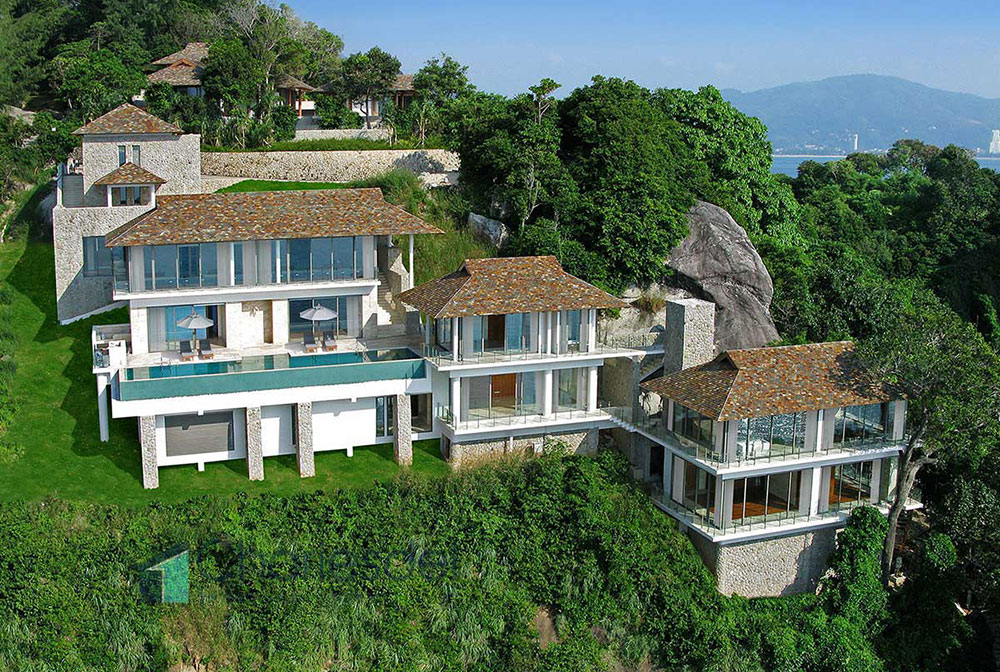The Thai government has announced significant proposals to amend property laws, aiming to make it easier for foreigners to invest in the country’s real estate market. These proposed changes, if enacted, could reshape the landscape for foreign property ownership in Thailand, particularly in resort destinations such as Phuket and Koh Samui. This article delves into the key aspects of the proposals, the current legal framework, and the potential impact on the real estate market.
Key Proposals to Amend Property Laws:
The two most significant proposals to amend the law are:
1. Extending Residential Lease Periods: The current maximum lease period for residential properties is 30 years. The proposed change would extend this period up to 99 years, applicable to both land and residential property.
2. Increasing Foreign Condo Ownership Quota: The proposal suggests increasing the quota of usable floor space within freehold condominium developments that can be purchased by foreigners on a freehold basis from the current 49% to 75%.
Current Legal Framework for foreign ownership of Property in Thailand
Foreign ownership of land and Houses/Villas:
Thai law states that foreigners cannot own land directly. The land itself can only be leased by the foreign investor. A lease for the land with a maximum term of 30 years can be registered directly in the foreigner’s name, but they cannot own the freehold of the land. In the case of landed properties, such as houses or villas in Phuket situated on land, the structure (house/villa) can be owned directly by the foreign buyer and registered in their name.
Since the maximum single lease period for residential property is 30 years, many villa and housing developments in Thailand are marketed to foreigners based on a renewable 30-year lease, typically with two or more renewals of 30 years each. Usually, the agreements to renew the lease for additional 30-year terms are built into the initial contracts and are often paid for at the time the property is purchased. However, there is a degree of risk concerning the security of these lease renewals. For example, the land could be sold, and the investor would be relying on the new landowner honouring the lease renewal, which is essentially a written promise by the initial lessor. Whether or not lease renewals are enforceable is a grey area in Thai law, with few precedents set by previous cases.
To circumvent the foreign ownership restrictions on land, it has become common for foreign investors to set up a Thai company as a vehicle for holding the freehold of the land. Typically, the foreign property investor will be a controlling director in the company, with various structures and articles in the company giving them virtually complete control. The foreign shareholding can be a maximum of 49%, with a minimum requirement of two Thai shareholders. However, the practice of using a Thai company with Thai nominees purely as a land ownership vehicle is against Thai law and is unlikely to withstand legal scrutiny. If the company operates as a legitimate business, trading, generating income, and paying dividends to shareholders who are not classified as nominees, then these companies are legally permissible
Foreign ownership of Freehold Condominiums & Apartments:
In Thailand, How are Freehold Condominiums Distinct from Apartments?
Even though the terms “condominium” and “apartment” are often used interchangeably, in Thailand, freehold condominiums and apartments have entirely different ownership structures for foreign buyers. Additionally, freehold condominiums offer buyers co-ownership of the common areas.
Freehold Condominiums: In Thailand, a freehold condominium development has a special condominium license, which allows the developer to sell up to 49% of the total floor space of all units to foreign buyers on a freehold basis. A foreign investor who purchases a unit within this 49% foreign freehold quota can register the freehold of their unit directly in their own name and own it indefinitely.
Once the 49% foreign freehold quota is reached, any new foreign buyers are not allowed to register the freehold of their property directly in their own name. Instead, the ownership options are either to take out a 30-year lease on their unit or to hold the freehold of the unit through a Thai company which they control.
In a condominium development, ownership of a unit also includes co-ownership of the common property (such as parking areas, utilities, swimming pools, gyms, gardens, etc.). In other words, you have the title to your own unit as well as co-ownership of the common areas.
Apartments: For an apartment development without a condominium license, foreign buyers cannot purchase the freehold of their unit. Instead, they secure ownership rights through a 30-year lease, and/or sometimes by holding shares in a company that owns the freehold of the land for the development.
Proposal Details and Timeline
Extending Lease Periods to 99 Years
Source Bangkok Post, on June 18, 2024, the Ministry of Interior, which oversees the Department of Lands, was authorised to study the feasibility of extending lease periods. The proposed amendment involves extending lease periods from 30 years to 99 years by amending Section 4 of the Rights over Leasehold Asset Act. This change is expected to make Thai real estate more attractive to foreign investors by providing greater security and stability.
Increasing Foreign Ownership in Condominiums to 75%
On June 21, 2024, Deputy Prime Minister Phumtham Wechayachai confirmed a proposal to raise the proportion of foreign ownership allowed in condominiums from 49% to 75%. This change aims to stimulate the real estate market, particularly in areas popular with foreigners like Bangkok, Phuket, and Pattaya. However, conditions such as forfeiting voting rights in condominium management if foreign ownership exceeds 49% may be implemented to balance local interests.
The discussions about these changes began with a cabinet resolution in April 2024, aimed at stimulating the economy through the real estate sector and preparing the country to become a global industrial hub. Issara Boonyoung, honorary president of the Housing Business Association, and representatives from seven real estate organizations have expressed strong support for these initiatives. These organizations include:
• The Housing Business Association
• The Thai Condominium Association
• The Thai Real Estate Association
• The Home Builder Association
• The Real Estate Sales and Marketing Association
• The Thai Real Estate Brokers Association
• The Real Estate Development Committee of the Thai Chamber of Commerce
Peerapong Jaroon-ek, honorary president of the Thai Condominium Association, mentioned that these legislative changes could take one to two years to pass and take effect.
Economic and Market Implications
Real estate experts and local industry executives have expressed strong support for these proposals. Extending lease terms and increasing foreign ownership in condominiums are seen as measures that could substantially boost foreign investment, stimulate economic growth, and enhance the competitiveness of Thailand’s real estate market on the global stage.
Potential Benefits of the Two Proposals
Increased Foreign Investment
Increasing land and property lease periods from the current maximum of 30 years to up to 99 years would undoubtedly have a very significant positive effect on foreign investment in real estate in Thailand. At present, many foreign investors are discouraged from buying land and properties due to the relatively short 30-year lease term, uncertainty over lease renewals, and the complications, expenses, and substantial risks associated with indirectly owning the freehold via Thai limited companies. By extending the lease period to 99 years, long-term leases would provide greater security and stability, encouraging foreigners to invest in property development, tourism infrastructure, and other long-term projects. This influx of foreign capital could significantly boost the Thai economy.
In resort destinations, including Phuket, Pattaya, Koh Samui, along with Bangkok, where freehold condominiums are marketed to foreign investors, increasing the saleable floor space for the foreign condo ownership quota from 49% to 75% would also have a very positive effect on property investment from overseas buyers
Economic Growth and Job Creation
The increased foreign investment is expected to stimulate economic growth and create job opportunities. The real estate and construction sectors, in particular, could see substantial growth, leading to increased demand for local labour and services. This, in turn, could have a positive ripple effect on related industries such as hospitality, retail, and transportation.
Development of Infrastructure
With more foreign investment, there could be an accelerated development of infrastructure projects. Improved infrastructure, such as transportation networks, utilities, and public amenities, would benefit not only the foreign investors but also the local population. Enhanced infrastructure could also make Thailand more competitive on the global stage, attracting even more foreign businesses and tourists.
Increased Property Values
The extended lease periods could lead to an increase in property values. Foreign investors are often willing to pay a premium for long-term security, which could drive up the prices of land and properties in strategic areas. This increase in property values could benefit local landowners and contribute to overall economic prosperity.
Localisation of The Proposed Changes
The proposed changes, if enacted, are likely to have varied impacts across different regions. For example, the increase in foreign ownership quotas for condominiums will primarily benefit resort destinations like Phuket, Pattaya, and Koh Samui, where such properties are heavily marketed to international buyers. In contrast, the extension of lease periods to 99 years will have a broader impact across the entire country, affecting both Thai and overseas investors. This change will be particularly pronounced in areas where foreigners currently face restrictions on buying freehold land in their own name, making these regions more attractive to foreign investors. By providing a more secure and stable investment environment through longer lease terms, these changes could stimulate foreign investment in both urban and rural areas, fostering economic development across Thailand
Likelihood of Enactment
It should be noted that in recent years there have been several proposals to allow some direct ownership of land in Thailand by foreign investors, subject to certain qualifying criteria, such as minimum investment levels. But none of these proposals have been enacted into law so far.
However, there has been considerable publicity in the first half of this year regarding the crackdown by the Thai government concerning the illegal acquisition of land by foreigners using Thai holding companies with nominees. This has underscored the need for a legitimate solution to permit some controlled ownership of land in Thailand by foreign investors. In light of this, the likelihood of these newly proposed law changes being implemented has increased significantly.
Pent-up Demand
Due to the recent publicity surrounding the stricter enforcement of laws prohibiting the use of limited companies purely as holding vehicles for land by nominee shareholders, some real estate agents in resort destinations such as Phuket and Koh Samui have reported that discerning investors are exercising caution. These investors are holding off on committing to purchases due to the crackdown on foreign-controlled companies holding land until there is more clarity over the legal framework and structures. There is a degree of ambiguity regarding which companies holding the freehold of land are permissible and which are not. As a result, there is likely to be some pent-up demand for land and houses/villas. However, this does not imply that the market for overseas property investment is currently depressed; rather, investors are being more cautious before committing to purchases involving company structures.
Final Thoughts
The proposed changes to Thailand’s property laws represent a significant shift towards making the country more accessible to foreign investors. Extending lease periods to 99 years and increasing foreign ownership quotas in condominiums to 75% are expected to bring substantial benefits to the real estate market and the broader economy. By providing greater security and stability through extended lease terms, foreign investors would be more inclined to invest in long-term projects such as property development and tourism infrastructure. This influx of foreign capital could significantly boost the Thai economy, stimulating economic growth and job creation, particularly in the real estate and construction sectors. Additionally, increased foreign investment could lead to the accelerated development of infrastructure projects, improving transportation networks, utilities, and public amenities, which would benefit both foreign investors and the local population. Enhanced infrastructure could further make Thailand more competitive on the global stage, attracting even more foreign businesses and tourists. Furthermore, the extended lease periods could drive up property values, benefiting local landowners and contributing to overall economic prosperity. Given the recent government crackdown on illegal land acquisition practices, there is a growing need for a legitimate solution to allow controlled foreign ownership of land, making the enactment of these proposed law changes increasingly likely. For those looking to invest in Thai real estate, particularly in the Samui and Phuket property market, these changes could present new and exciting opportunities.



